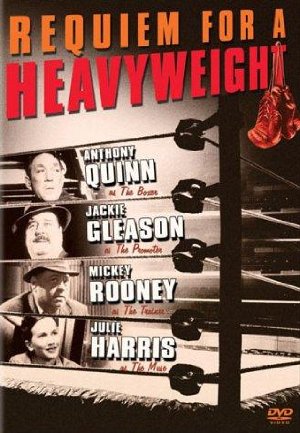Requiem for a Heavyweight (1962)
May 28, 2016 5:16 PM - Subscribe
Mountain Rivera, a punchy has-been managed by the unprincipled Maish, is mauled in a fight and forced to quit boxing. Can his devoted cutman and a sympathetic social worker help him find a life outside the ring, or will Maish find a way to exploit him one more time?
NYTimes: No knockout, this new film version of Rod Serling's highly praised work is a serious incisive drama that pulls no punches in its low-keyed exposure of its pitiable has been hero and the sleazy, harried sidekicks who share his sweat-stained and blood-stained world.
In making the jump from the small to the large screen, Mr. Serling and Ralph Nelson, who directed the original and is making his movie debut with "Requiem," necessarily have invited comparisons, odious though they may be. They have, to put it briefly, filled out certain areas of the TV version and changed a few others.
What remains still retains the basic, unrelenting honesty of Mr. Serling's theme—the terrible loneliness and tragic confusion of the rootless at the end of a rocky, if occasionally triumphant, road. And it glaringly reveals the shockingly seamy trade that uses people callously and wastefully. While this heavyweight does not emerge as a figure as poignant and striking as his predecessor the film nevertheless hits hard and uncompromisingly at man's inhumanity to man.
Variety: The performances of Quinn and Gleason are equally matched and carry the picture, no small chore. Quinn’s punchy, inarticulate behemoth is so painfully natural that one winces when he feels pain, whether to his body or his feelings. Gleason is amazingly fine. He’s weak, crafty, shiftly and still a little pathetic.
Trailer
Teleplay
Culture Vulture article re teleplay
NYTimes: No knockout, this new film version of Rod Serling's highly praised work is a serious incisive drama that pulls no punches in its low-keyed exposure of its pitiable has been hero and the sleazy, harried sidekicks who share his sweat-stained and blood-stained world.
In making the jump from the small to the large screen, Mr. Serling and Ralph Nelson, who directed the original and is making his movie debut with "Requiem," necessarily have invited comparisons, odious though they may be. They have, to put it briefly, filled out certain areas of the TV version and changed a few others.
What remains still retains the basic, unrelenting honesty of Mr. Serling's theme—the terrible loneliness and tragic confusion of the rootless at the end of a rocky, if occasionally triumphant, road. And it glaringly reveals the shockingly seamy trade that uses people callously and wastefully. While this heavyweight does not emerge as a figure as poignant and striking as his predecessor the film nevertheless hits hard and uncompromisingly at man's inhumanity to man.
Variety: The performances of Quinn and Gleason are equally matched and carry the picture, no small chore. Quinn’s punchy, inarticulate behemoth is so painfully natural that one winces when he feels pain, whether to his body or his feelings. Gleason is amazingly fine. He’s weak, crafty, shiftly and still a little pathetic.
Trailer
Teleplay
Culture Vulture article re teleplay
The TV version is on YouTube too. It's actually the only version that I've seen, I should catch the movie version.
posted by octothorpe at 5:08 AM on May 29, 2016 [1 favorite]
posted by octothorpe at 5:08 AM on May 29, 2016 [1 favorite]
Oddly, the TV version has an optimistic ending and the movie has a pessimistic one. Seems like it's usually the other way around, for some reason (e.g. "The Bad Seed"). I always thought Mickey Rooney more or less walked away with the film.
posted by holborne at 9:26 AM on June 1, 2016
posted by holborne at 9:26 AM on June 1, 2016
You are not logged in, either login or create an account to post comments

posted by Ursula Hitler at 12:41 AM on May 29, 2016 [1 favorite]